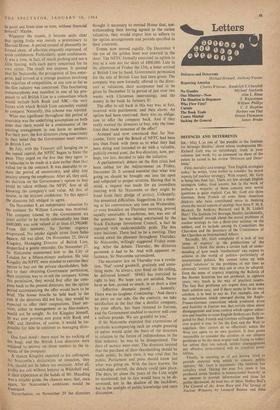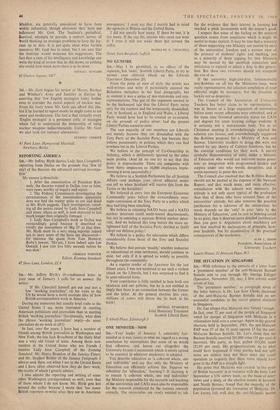lik aa Letters
Defences and Deterrents Michael Howard, Anthony Verrier Reporting America Charles Wintour, Randolph S. Churchill
No Gunfire Michael Starforth One Minister—Now Alan L. Bin= The Situation in Singapore S. Rajaratnam Who Flew First? William Phillips Curtain C. J. Hopkins The Book Trade Herbert van Thal Courts Martial Dennis Thompson Sacking the General lames Bredin
DEFENCES AND DETERRENTS
SIR,—May I, as one of 'the pundits at the Institute for Strategic Studies,' about whose inadequacies Mr. Richard Gott was so refreshingly frank in your columns last week, try to comment on three of the points he raised in his review 'Defences and Deter- rents.'
First, morality and strategy. 'Few English strategists today,' he writes, 'even bother to consider the moral aspects [of nuclear strategy].' With respect, Mr. Gott is being less than fair. There are few enough English strategists today, God knows; but in the work of perhaps a majority of them concern over moral questions is quite explicit. Can Mr. Gott cite three German, three French or even three American .thinkers who have contributed more to thinking about,the moral aspects of strategy than have P. M.S. Blackett, Sir Anthony Buzzard, and B. H. Liddell Hart? The Institute for Strategic, Studies, incidentally, has 'bothered' enough about the moral problems of nuclear strategy to run a three-year seminar on the subject, and to include among its Councillors the Chairman and the Secretary of the Commission of the Churches on International Affairs.
Secondly, Mr. Gott complains of a lack of any 'sense of urgency' in the publications of the Institute. I think this shows a certain lack of under- standing of how much 'intellectuals' can expect to achieve in the world of politics—particularly of international politics. We cannot come up with global 'solutions' to the problems of our time so obviously 'correct' that they can at once be adopted. Even the sense of urgency inspiring the Bulletin of the Atomic Scientists has not produced, in eighteen years, very much in the way of practical results. The fact that problems are urgent does not make their solution easy; and if there seems to be no easy solution, it is best to say so. For example, one of the conclusions which emerged during the Anglo- Franco-German consortium which produced Arms and Stability in Europe was that certain ideas about disengagement and arms control which appear attrac- tive and feasible to some English thinkers are flatly re- jected by their French and German colleagues. How- ever urgent it may be for the East and the West to negotiate, they cannot do so effectively unless the West can agree on its own position, It thus seems reasonable to consider the solution of our alliance problems to be the most urgent task facing us today; for unless they are solved, neither disengagement nor effective arms-control will be practical possi- bilities.
Finally, in accusing us of not having 'tried to provide material with which to educate public opinion,' Mr. Gott is inaccurate. The Institute has certainly tried. During the past five years it has produced seven 'Studies in International Security' in an attempt to provide information and ideas for public discussion. At least two of these, Hedley Bull's The Control of the Arms Race and The Spread of Nuclear Weapons by Leonard Beaton and John Maddox, are generally considered to have been widely influential; though obviously they have not influenced Mr. Gott. The Institute's periodical, Survival, attempts to provide a current survey of Ivorld thinking on strategic problems to keep the lay- man up to date. It is not quite clear what further measures Mr. Gott has in mind, but I am sure that the Institute would welcome his suggestions. The fact that a man of his intelligence and knowledge can write the kind of review that he did shows, as nothing else could, how much more there is to be done.



































 Previous page
Previous page